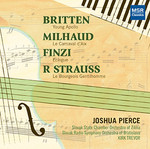|
Back
12/03/2021
Benjamin Britten: Young Apollo, opus 16 [1]
Darius Milhaud: Le Carnaval d’Aix, opus 83b [2]
Gerald Finzi: Eclogue, opus 10 [3]
Richard Strauss: Le Bourgeois gentilhomme, opus 60 [4]
Joshua Pierce (piano), Frantisek Figura (violin), Pavol Simcik (cello), Maria Duhova (harp), State Chamber Orchestra of Zilina [1, 2, 4], Slovak Radio Symphony Orchestra of Bratislava [3], Kirk Trevor (conductor)
Recording: Concert Hall of the State Chamber Orchestra of Zilina, Slovakia (January 24 [2], 25 [1], and 26-27 [4], 2004) and Slovak Radio Studio No. 2, Bratislava, Slovakia (March 31, 2005 [3]) – 69’11
MSR Classics MS 1756 – Booklet in English

   
Joshua Pierce is one of those rare pianists who taps into every corner of the classical music kingdom and turns any composition into an invigorating outcome. Other poignant qualities within his output are his flexibility and pliability. One of the specialized niches inside which the pianist greatly excels is showpieces for piano and orchestra, one being M. Pierce’s illustrious “Bravura”. This format continues only this time a suffusion of neoclassicism prevails. Parceled out between four composers is a spread of striking directness…at times piercing, snappy, wonky, endearing and sarcastic. Vestiges of World War I or World War II tapped into the psyche in a direct or indirect way for each of these four men. Joshua Pierce, along with spots of violin, cello and harp solos, create a stunning composite.
Joshua Pierce’s subtly-staggered running scale opens Britten’s minimalist Young Apollo with its shallow strikes of atonality and pearly lofts of arpeggios that are later accented by Frantisek Figura’s slides of sinewy astringency. Brilliant in his vision, Britten’s generous use of ostinato beelines to Philip Glass with an amazing composition.
The core of Le Carnaval d’Aix’s music, culled from Darius Milhaud’s Salade, is like moving through a modernistic template extension of Ricardo Drigo’s commedia dell’arte Harlequinade dancers, only this time Milhaud’s stock figure sketches are given broader variety of sabor, and a journey housing sharper resiliency and multi-faceted textures.
Contrasting to Milhaud, the album pivots to a more pensive stance during Gerald Finzi’s Eclogue whereby the dialogue between M. Pierce and the orchestra is evenly divided. The conversation is lusciously realistic and homely. Bucolic privacy is woven inside Finzi’s matrix, at times giving glance to Canadian pianist David Foster, especially when encountering the brief chat between Pierce and Frantisek Figura’s violin. The fluid legato takes a side bow to Elgar or even Vaughan Williams with Joshua Pierce delivering a highly emotional reading of this passage.
Incidental music originally provided for Molière’s play, Le Bourgeois gentilhomme, was later turned into an orchestral suite by Richard Strauss in 1920. Strauss gave interesting variations of instrumental dominance inside the nine course menu: “Entry and Dance of the Tailor” gives Frantisek Figura weighty opportunity to meticulously squeak away on the violin while the piano adds shades of whimsy and farcical venture. Violin continues to command the stage in the “A Minuet of Lully”; however, Pavol Simcik has his own brief yet personal interlocution with M. Figura... this is one of the loveliest conversations in Le Bourgeois gentilhomme. Maria Duhova’s dulcet harp adds an elegant entrée to Act II during the “Prelude”. The conclusion begins with rambunctious fanfare as “The Dinner” is being arranged for the widowed Marquise Dorimène. Structurally, the beginning and closing measures find intriguing similarities to the confectionary ballet, Schlagobers,
yet there’s a milder discourse that unravels between the three string soloists (3:40) which adds a touch of nostalgia and composure before a cacophonic abruption ensues once again. Suddenly, Rosenkavalier surfaces and the oboe/clarinet duo pops up. Close to the finish line the horns hit the airwaves by making declamatory shots of brassy blows with Joshua Pierce following in hot pursuit by slowly sitting down in the driver’s seat to lead the suite’s inertia forward to its ultimate climax.
The importance of this CD is MSR Classics’ ability to capture a full articulation of piano and orchestra and how each entity has its own position in evoking a deeply refreshing élan. Undoubtedly, Joshua Pierce’s performance is simply stunning and filled with effervescence.
A strong consideration for neoclassical fans in the mood for something punchy.
Joshua Pierce Website
Christie Grimstad
|